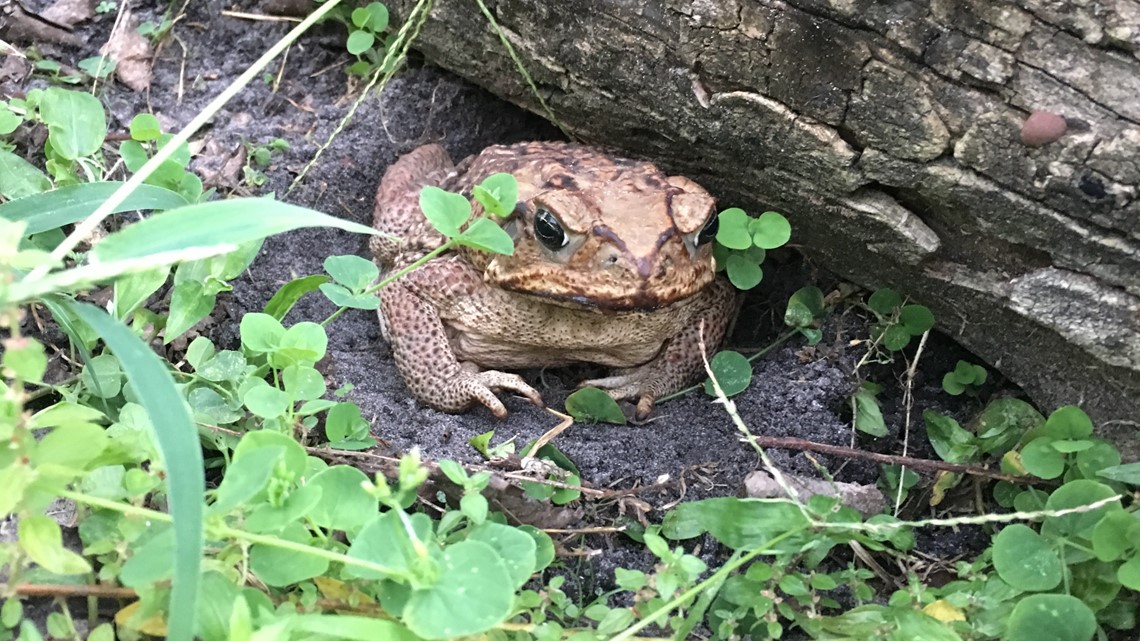WESTCHASE, Fla. — Tina and Daniel Pipp of Westchase are keeping a closer eye on their two dogs these days — especially 11-year-old Haley.
"It was very traumatic," Tina Pipp said. "They're our family and we just love them so much."
As shy as Haley can be strangers, she's full of energy outdoors and known to be a fearless hunter.
However, one night in late June, the family found Haley having a seizure after spending time in their backyard. Her head was back and her legs were stiff.


It didn't take long before Daniel Pipp rushed Haley to BluePearl Pet Hospital in Tampa, where he learned the dog had been poisoned by a cane toad.
"She couldn't move," Daniel Pipp explained. "I really knew she was in trouble."
Cane toads, also known as bufo or marine toads, are not native to Florida.
Their venom, which is secreted when the toad feels threatened, can be especially toxic to pets. Death in some animals may occur by cardiac arrest within 15 minutes.
Haley appeared to have bitten on a toad, which triggered a release of the toxins. Daniel Pipp said he is thankful he got to the vet in just enough time.


"I hope that this doesn't happen to somebody else," Daniel Pipp said.
After Haley was able to make it through the night with care from the veterinarian staff, she was able to come home within 24 hours. After a few days of weakness, she's back to being her energetic and fearless self.
However, the family warns if it happened to their pet, it can happen to yours.
They are urging pet owners to learn from their experience. For instance, simply knowing your closest 24/7 pet emergency center can save its life, Daniel Pipp explained.
"Like Dan said, if you're prepared, if you're aware, then hopefully no one is going to have to lose, you know, their pet. Their family member," Tina Pipp said.
According to Florida Fish and Wildlife Conservation Commission, cane toads breed year-round in standing water, streams, canals and ditches. However, they can be more prevalent during summertime.
Experts recommend you keep a close eye on your pets when outside or keep dogs on a leash.
- Immediately and vigorously flush your pet's mouth with water to prevent further absorption of the toxin.
- Be sure to hold the mouth open and downward to keep your pet from swallowing more of the toxin.
- Get your pet to your veterinarian right away.
- While on your way, call ahead so that they can prepare for emergency arrival.
- Protect yourself with nonabsorbent gloves and protective eyewear, and wash your own hands and all other exposed areas.
Here's what you need to know about the toads from the University of Florida's Department of Wildlife Ecology and Conservation website:
- Cane toads are invasive.
- They eat a lot!
- They eat native frogs, lizards, snakes and even small mammals, pretty much anything that fits in their mouths.
- They have large triangular poison glands on the shoulder. When a dog bites down, the glands ooze or quirk out the poison. Left untreated it could be deadly
Symptoms your dog has had a run-in with a marine toad:
- Pawing at the face and mouth.
- Foaming at the mouth
- Dark red gums
- Disorientation or frantic behavior
- Whining
- Seizures
Good native Southern toads versus bad invasive cane toads:
Don’t go around killing every toad you see!
If the toad is more than four to six inches, it’s not native.
Check out this picture from the University of Florida that shows how you can tell the native southern toad from the invasive marine toad.


Finally, toad proof your home:
- Turn off outside lights at night.
- Get yellow “bug” lights that don’t attract insects or motion sensor security lights.
- Trim shrubs short so limbs don’t touch the ground and provide places for them to hide.
- Remove debris and clutter in your yard.
- Don’t leave pet food outside at night – toads will learn you have an easy meal around and make your porch their home.
- Empty pet water bowls at night.
- Eliminate other sources of water in your yard.
You can find more on invasive cane toads and how to humanly kill them here.

